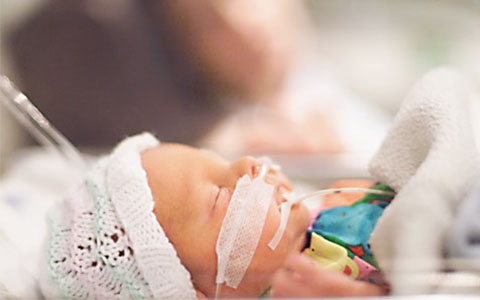Background
Project: NEUROSIS
Premature newborn babies frequently suffer from difficulties in breathing during their first weeks of life, a condition known as respiratory distress syndrome. In such cases, they are normally given oxygen therapy with the aid of an airway pressure machine or a ventilator.
However, this treatment can stop the normal lung development and can trigger a major complication known as bronchopulmonary dysplasia, or BPD. In the United Kingdom the overall incidence of BPD is reported at about 20% of ventilated newborns; in the US it is estimated to cost over $ 2.4 billion per year.
To address the BPD problem, the European Union (EU)-funded NEUROSIS project, led by Tübingen University Hospital in Germany, is conducting one of the largest randomised and controlled studies of the breathing problems of premature babies ever done in Europe. In particular, the project team examines the effectiveness of inhaling budesonide (a type of steroid widely used in asthma treatment for adults) in combatting the BPD condition.
BPD can possibly cause death, but may also lead to impaired brain development of newborn babies. There is even concern as to whether people who have had BPD as babies can ever have a normal lung function later on in life.
Corticosteroids – man-made drugs that closely resemble cortisol, a hormone that the adrenal glands produce naturally – are effective in preventing BPD, but, if given systemically, may have adverse effects on brain development. This has prompted the search for an alternative, e.g. via inhalation. One appropriate candidate is budesonide, which has been used for this purpose for many years, but its effectiveness has never been tested in a sufficiently large study.
The criteria for the NEUROSIS study were established by an international team of neonatologists, experts in the conditions and care of newborn and premature infants.
A total of over 2,000 premature infants were screened and the target sample size of 850 infants was achieved in mid-2013.
In addition to investigating whether these babies’ chances of survival without BPD are higher, impact of this treatment on their brain development will be assessed once they have reached an age of 18 to 22 months.
“Although we recently achieved our projected sample size, we expect initial study results only in early 2014, and data on brain development at 18-22 months will not be available until 2016,” comments the Project Coordinator, Professor Christian Poets of Tübingen University Hospital, Germany. “However, we are hopeful the results will show that budesonide can save babies’ lungs and lives without putting them at risk of disturbed brain development,” he concludes.
This innovation was made possible by Israel’s continued participation in the official Horizon 2020 fund, managed in Israel by ISERD part of The Israel Innovation Authority (Formerly the Office of the Chief Scientist and MATIMOP). The initiative has taken Israeli R&D to the next level with the help of ground-breaking collaboration between scientists in Israel and Europe, as well as essential funding and support.
Project details
Project acronym: NEUROSIS
Participants: Germany (Coordinator), Finland, UK, Nederlands, France, Italy, Czech Republic, Belgium, Greece, Israel
FP7 Proj. N° 223060
Total costs: € 7 383 283
EU contribution: € 5 623 414
Duration: March 2009 – August 2015
